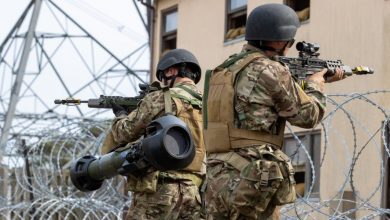Türkiye to attend Arab League ministerial for 1st time in 13 years

Foreign Minister Hakan Fidan to attend 162nd session of council on Tuesday in Cairo, where he will deliver remarks on Türkiye-Arab League relations and regional issues, particularly Gaza war
Türkiye is set to participate in the Arab League’s Council of Foreign Ministers meeting for the first time in 13 years, following an invitation from the organization, according to diplomatic sources.
Türkiye will join the 162nd council meeting scheduled for Tuesday in Egypt’s capital Cairo. Turkish Foreign Minister Hakan Fidan is expected to deliver remarks during the opening session, focusing on Türkiye-Arab League relations and regional issues, especially the situation in Gaza.
Diplomatic efforts under Erdogan’s leadership
Experts say Türkiye’s invitation is a result of normalization efforts led by President Recep Tayyip Erdogan. Fidan played a key role in these diplomatic processes behind closed doors during his tenure as head of Türkiye’s National Intelligence Organization (MIT), fostering ties with Gulf countries.
Fidan’s recent participation in the EU’s informal meeting of foreign ministers, known as the Gymnich, in August, after a five-year gap, is seen as a reflection of Türkiye’s global and regional influence under Erdogan’s leadership, and Fidan’s long-term diplomatic efforts.
Experts also note that convincing Iraq to cooperate against the PKK terrorist group has been a process that Fidan worked on for years under Erdogan’s leadership.
The invitation to the Arab League Summit signals an end to the “negative campaigns” the Arab League previously ran against Türkiye and the beginning of a new period of close cooperation, the sources said.
Results of Türkiye’s foreign policy
Türkiye’s “strong and determined foreign policy” has made the country an increasingly active player in promoting stability, peace, and prosperity in both its immediate geography and the wider region, diplomatic sources said.
The sources emphasize that many topics on the Arab League’s agenda, especially Palestine, are among the priorities on Türkiye’s foreign policy agenda.
Noting that Türkiye’s recently deepening and diversifying relations with Arab countries offer new opportunities for both resolving existing regional problems and establishing future-oriented collaborations based on mutual benefit, the sources said that enhancing institutional relations and coordination with the Arab League is currently on the agenda.
The sources also mentioned that Fidan’s invitation reflects the developing bilateral relations with member states as well as the growing interest in Türkiye’s role in the region.
Historical context of Türkiye-Arab League ties
The sources recalled Türkiye’s relations with the Arab League began developing in 2003, with a “Memorandum of Understanding between the Ministry of Foreign Affairs of the Republic of Türkiye and the General Secretariat of the AL” signed in 2004.
The Turkish-Arab Cooperation Forum Framework Agreement, signed in 2007, further solidified these ties. The Arab League mission in Ankara was inaugurated in January 2010.
Recent diplomatic contacts
In recent months, Fidan has engaged with Arab League officials to enhance ties. He met with Arab League Secretary-General Ahmed Aboul Gheit during a visit to Cairo in October 2023.
On Feb.28, political consultations were held in Ankara, under the chairmanship of former Deputy Foreign Minister Ambassador Ahmet Yildiz and Assistant Secretary-General of the Arab League Ambassador Hossam Zaki. Zaki also attended the Antalya Diplomacy Forum.
During the 33rd Arab League Summit held in Bahrain on May 16, “The Arab Ministerial Committee on Turkish Interference in the Internal Affairs of Arab Countries” was dissolved, and no decision regarding Türkiye’s interference in Arab countries’ internal affairs was brought to the agenda. Furthermore, no anti-Türkiye stance was included in the summit’s declaration.
During his visit to Egypt on Aug. 4-5, Fidan met with Aboul Gheit again. On Aug. 7, the Turkish foreign minister hosted a dinner in Ankara for ambassadors from Arab League member states.
Past participation in Arab League Meetings
Former Turkish Foreign Minister Abdullah Gul attended the Arab League meeting in Cairo in 2007, while former Foreign Minister Ahmet Davutoglu participated in the Arab League meeting in 2010. President Erdogan, then prime minister, addressed the Arab League meeting’s opening session in September 2011.
These meetings are held twice a year, in March and September, in Cairo.
Türkiye’s return to Gymnich
Türkiye was also invited to the EU’s informal foreign ministers’ meeting in Brussels in August, marking its return to the forum after five years.
Following the Gymnich meeting, Fidan told Anadolu that the meeting in Brussels was significant for revitalizing Türkiye’s relations with the EU.
During his Brussels visit, Fidan held several bilateral meetings with his counterparts.
Source: TRT World





